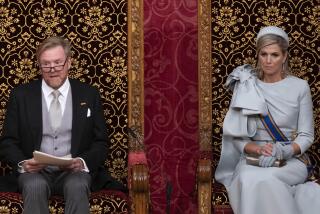South Africa Will Scrap Pass Laws, Free Offenders
- Share via
JOHANNESBURG — The South African government said Friday that it will stop enforcing pass laws, the hated cornerstones of apartheid that kept blacks out of white areas, and will release people jailed for violating them.
President P. W. Botha told Parliament that a moratorium on pass-law arrests will begin Wednesday, when he proposes a new law providing common identity documents for all races. He said anyone in jail for pass-law offenses will be freed and all pending charges will be dropped.
The laws, formally called “influx control,” are one of the sorest points in the official race policy with which South Africa’s 5 million whites maintain supremacy over the 24 million voteless blacks. More than 2.5 million blacks have been arrested in the last decade for being outside tribal homelands without the right stamp in their passes.
Critics of apartheid applauded the suspension of enforcement but said they feared that Botha might produce an alternative form of control.
Desmond Tutu, the black Anglican bishop recently elected archbishop of Cape Town, said the moratorium “can only be welcomed. However, I hope there is not a sting in the tail. One has to be very careful that they are not going to find another way of harassing blacks.”
Muntu Myeza, spokesman for the militant Azanian People’s Organization, said it was “about time,” but added: “The removal of one area of repression--the pass laws--comes too late. What we want now is . . . the establishment of a fully democratic and just society.”
Cautious Assessment
Another cautious assessment came from Sheena Duncan, a white leader of the Black Sash women’s group that helps blacks with pass problems: “All of a sudden to be able to be free to live and work where you want, if it really happens, would be of great significance. You’d have a tremendous explosion in growth and excitement and job creation.
“But we do not understand why he (Botha) has not simply repealed (the laws). It can only take this long if he’s drafting something to take its place.”
Two laws adopted in 1952 form the backbone of “influx control,” which restricts blacks without permits to 10 tribal homelands that cover 13% of the country’s territory. About 13 million blacks live in the homelands and 11 million occupy black townships in nominally white areas.
One law bars blacks from staying in white South Africa, including the cities, for longer than 72 hours without permission. The other requires blacks to carry passes with the required permit.
Other laws restricting black movement include those that impose curfews and allow blacks to be sent back to homelands if they remain unemployed in white areas for more than three months and thus are “idle and undesirable.”
Especially Harsh
Pass laws have been especially harsh for the more than 1 million black migrant workers, who must sign one-year contracts to work in white areas and leave their families behind in the homelands.
Arrests for pass law violations have been decreasing. From a high of 262,000 in 1983 they fell to 163,000 in 1984 and 132,000 last year. Some white employers have been charged for hiring rural blacks without passes.
Botha said in February that laws restricting black movement were discriminatory and would be scrapped by July 1. He promised a system of “positive urbanization” that would apply to all race groups.
In his speech to Parliament on Friday, Botha said that passbooks now carried by blacks will be replaced by common identity books for all races beginning July 1.
A presidential advisory body said last year that influx control should be repealed and economic forces should determine the flow of blacks to cities.
Opposed Previous Plan
It opposed a previous government plan to require that blacks have approved housing in an urban township as a condition for leaving the homelands. Such a rule would bar rural blacks because of the long waiting lists for township housing.
Duncan said she fears that the government might tie “urban rights” to jobs, thus excluding rural blacks from the economy’s growing “informal sector” of small entrepreneurs and other opportunities.
White business groups also have recommended that the pass laws be repealed, calling them a restraint on normal market forces and a source of bitterness among blacks.
South Africa has been racked by violence against apartheid for 19 months and more than 1,400 people have been killed, nearly all of them black.
More to Read
Sign up for Essential California
The most important California stories and recommendations in your inbox every morning.
You may occasionally receive promotional content from the Los Angeles Times.













